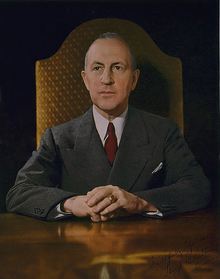Lloyd Crow Stark
| Lloyd Stark | |
|---|---|
 |
|
| Chair of the National Governors Association | |
|
In office June 26, 1939 – June 2, 1940 |
|
| Preceded by | Robert Leroy Cochran |
| Succeeded by | William Henry Vanderbilt III |
| 39th Governor of Missouri | |
|
In office January 11, 1937 – February 26, 1941 |
|
| Lieutenant | Frank Gaines Harris |
| Preceded by | Guy Brasfield Park |
| Succeeded by | Forrest C. Donnell |
| Personal details | |
| Born |
Lloyd Crow Stark November 23, 1886 Louisiana, Missouri, U.S. |
| Died | September 17, 1972 (aged 85) Clayton, Missouri, U.S. |
| Political party | Democratic |
| Education | United States Naval Academy (BS) |
Lloyd Crow Stark (November 23, 1886 – September 17, 1972) was the 39th Governor of the U.S. state of Missouri. He was a Democrat.
Stark was born in Louisiana, Missouri, the son of Clarence McDowell and Lillie Crow Stark. Stark was a 1908 graduate of the United States Naval Academy. After serving four years as a naval officer, Stark went into the family business, the Stark Brothers' Nursery, as vice-president and general manager. He was a major in the U.S. Army during World War I. During his volunteer stint, he served in the United States and France, including the 1918 Meuse-Argonne offensive.
Stark's political career began in 1928 when he chaired Missouri's State Highway Bond Campaign. He served one term as the Governor of Missouri from 1937 to 1941 and was a delegate to Democratic National Convention from Missouri in 1940. During his gubernatorial term, Stark's administration established the Ellis Fischel Cancer Center, abolished interstate trade barriers, passed a police reorganization bill, and established a merit system for selection of state employees.
Lloyd Stark had a fierce political rivalry with Harry S. Truman, against whom he ran for the Senate in 1940—and lost when he and the prosecutor (Maurice M. Milligan), who toppled the Kansas City political machine, split the anti-Pendergast vote in the Democratic primary. Although the loss to Truman heralded the end of Stark's political career, he spent the remainder of his working life managing the Stark Brothers Nurseries. During this time, Stark influenced the political careers of Clarence Cannon and Stuart Symington. Stark died in Clayton, Missouri in 1972.
...
Wikipedia
